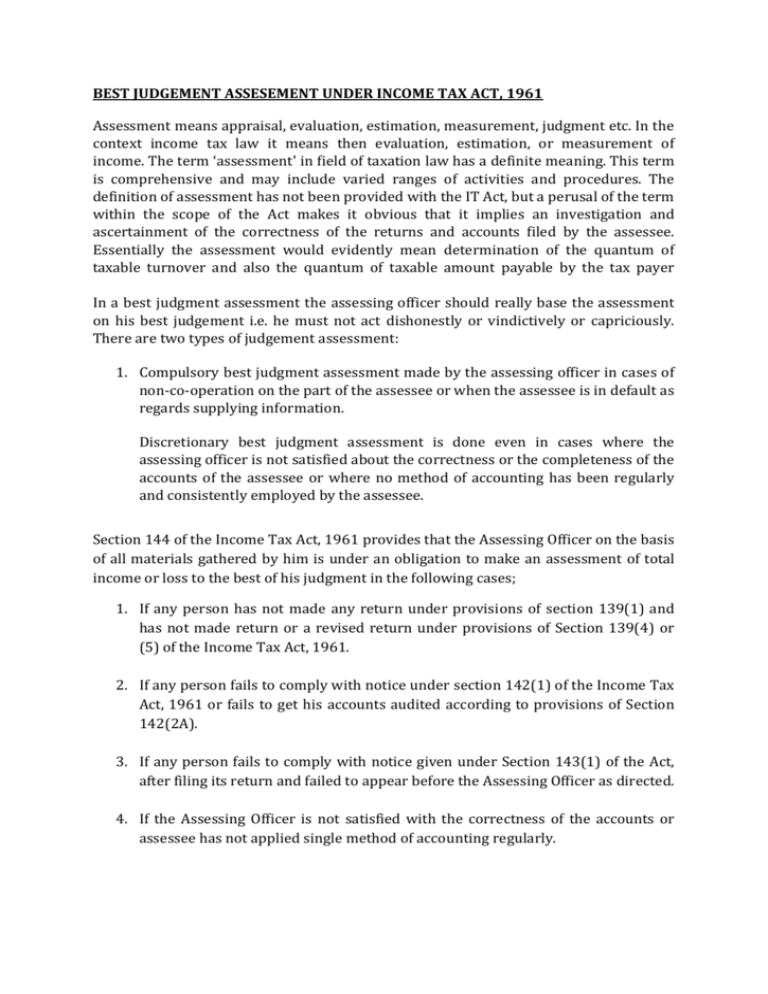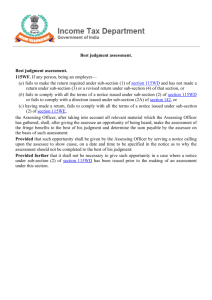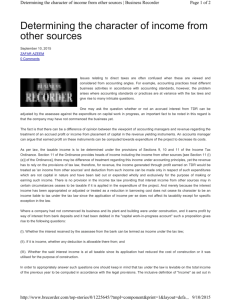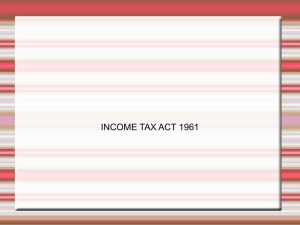Best Judgement Assessment: Income Tax Act, 1961
advertisement

BEST JUDGEMENT ASSESEMENT UNDER INCOME TAX ACT, 1961 Assessment means appraisal, evaluation, estimation, measurement, judgment etc. In the context income tax law it means then evaluation, estimation, or measurement of income. The term ‘assessment' in field of taxation law has a definite meaning. This term is comprehensive and may include varied ranges of activities and procedures. The definition of assessment has not been provided with the IT Act, but a perusal of the term within the scope of the Act makes it obvious that it implies an investigation and ascertainment of the correctness of the returns and accounts filed by the assessee. Essentially the assessment would evidently mean determination of the quantum of taxable turnover and also the quantum of taxable amount payable by the tax payer In a best judgment assessment the assessing officer should really base the assessment on his best judgement i.e. he must not act dishonestly or vindictively or capriciously. There are two types of judgement assessment: 1. Compulsory best judgment assessment made by the assessing officer in cases of non-co-operation on the part of the assessee or when the assessee is in default as regards supplying information. Discretionary best judgment assessment is done even in cases where the assessing officer is not satisfied about the correctness or the completeness of the accounts of the assessee or where no method of accounting has been regularly and consistently employed by the assessee. Section 144 of the Income Tax Act, 1961 provides that the Assessing Officer on the basis of all materials gathered by him is under an obligation to make an assessment of total income or loss to the best of his judgment in the following cases; 1. If any person has not made any return under provisions of section 139(1) and has not made return or a revised return under provisions of Section 139(4) or (5) of the Income Tax Act, 1961. 2. If any person fails to comply with notice under section 142(1) of the Income Tax Act, 1961 or fails to get his accounts audited according to provisions of Section 142(2A). 3. If any person fails to comply with notice given under Section 143(1) of the Act, after filing its return and failed to appear before the Assessing Officer as directed. 4. If the Assessing Officer is not satisfied with the correctness of the accounts or assessee has not applied single method of accounting regularly. Often instances may arise where the assessee maintains false accounts to evade the payment of tax and in such instances it becomes difficult on the assessing authority to precisely find the amount of turnover concealed. In such cases the judgment is made by the assessing officer to the best of his judgment and so long it is made in a non-arbitrary way and the nexus seems apparent the decision is final and there is no scope for interfering with the best judgment. Thus, in a way there remains no scope for challenging a best judgment assessment. This is because an assessee cannot be allowed to take advantage of his own illegal act. Note: In case of best judgement assessment it is necessary for AO to give assessee an opportunity of being heard. Such opportunity will be given to the assessee by way of a notice to show cause, why assessment should not be completed to the best judgment. If AO has given notice under section 142(1) of the Income Tax Act, 1961 then again notice of best judgement assessment is not required to be given to the assessee. Note: The Assessee has right to file an appeal against best judgement assessment according to the provisions of Section 246A or he can file a revision application according to the provisions of Section 264 of the Income Tax Act, 1961. Time Period : a best judgement assessment under Section 144 shall be completed within two years from the end of relevant assessment in all cases. WHEN BEST JUDGEMENT ASSESSEMENT CAN BE MADE; As decided in case of CIT v. Segu Buchiah Setty [1970] 77 itr 539(SC) best judgement assessement can be made on the basis of any conditions mentioned under Section 144. A.R.A.N. Chettiar Firm v. CIT 2ITC 477 –it was held that where the assessee has furnished or filed his/its income tax return on the basis of estimates. Thus Best Judgement Assessment can be made ignoring that the return was invalid. A Best Judgement Assessment can be made in cases when the return is not properly signed or verified. If books of accounts related to accounts filed by the assessee has not been produced before the AO. Note: if books of accounts are not in possession of an assessee or in possession of any government authority then best judgement assessment for not producing required books of accounts is invalid. ESTIMATION OF PROFIT;When the returns and the books of account are rejected, the assessing officer must make an estimate, and to that extent he must make a guess; but the estimate must be related to some evidence or material and it must be something more than mere suspicion. He must make what he honestly believes to be a fair estimate of the proper figure of assessment and for this purpose he must take into consideration such materials as the assessing officer has before him, including the assessee's circumstances, knowledge of previous returns and all other matters which the assessing officer thinks will assist him in arriving at a fair and proper estimate. In cases which clearly fall beyond the line of permissible guess work or arbitrariness, the assessment must be set aside. In estimating any turnover, it is inevitable that there is some guess- work. The assessing authority while making the best judgment assessment should arrive at its conclusion without any bias and on rational made by the assessing authority is a bona fide estimate and is based on a rational basis, the fact that there is no good proof in support of that estimate is immaterial. Prima facie, the assessing authority is the best judge of the situation. It is his best judgment and not of anyone else. GUESS WORK;In the estimation, there may be some overestimate and underestimate. That would not be sufficient for questioning the determination of the amount of tax payable by the dealer as determined to the best judgment. The term ‘to the best of judgment' of the assessing officer would envisage his judgment. Where the estimate is on account of arbitrariness, vindictiveness or capriciousness of the assessing officer, it cannot be said to be his judgment. The estimate based on the reputation of the dealer in the locality, the length of the period of his business to enhance the return turnover by 5% only cannot be said to be without any nexus when that aspect of the matter is not challenged. Reputation and the length of period of business would be sufficient nexus in the peculiar circumstance of a case, although the assessing authority can take turnovers of the previous years for the purpose of estimation. PENALTIES;In best judgment assessment, where the return has not been filed, the moment it is found that the dealer has transacted business and his turnover is taxable then penalty can be imposed. The mere fact there is best judgment, particularly when the assessment based on the inference flowing from the inability of the assessee to establish the case pleaded by him, will not be sufficient for the purpose of imposition of penalty, for the degree of proof required for the imposition of penalty is quite different from and is of a much higher order than that required for the purpose of making a best judgment assessment. Though an estimate made on best judgment basis may be legal, for the purpose of imposing penalty something more concrete is required which would enable the judicial mind to reach the conclusion that the dealer actually had the turnover which was fixed by best judgment. The order imposing penalty cannot sustain if there is no material available to conclude that there was any wilful suppression of the taxable turnover warranting a penalty. CONCLUSION:A general understanding of the procedure shows that the best judgment assessment procedure has given wide discretionary powers to the assessing authority to assess in the instances where there has been wilful suppression and concealment of income and turnover by the assessed. The power so provided is wide to the extent that the AO has the authority to assume from the documents so present as to provide an assessment with an increased or a decreased turnover based on the documents so provided. Even though the assumption may be guesswork it has a valid justification that all the turnover so recorded in order to correctly assume the turnover and thereby the returns in case of an attempt to intentionally conceal the tax payable by not displaying in the books of accounts and the other official documents. Tax assessment being a difficult area of work it is but imperative that the assessing authority should be provided with adequate powers for encountering tax evaders. The assessing officers in this respect have been given wide powers in that regard. It also aids in honest tax disclosures so as to avoid the rising concerns of tax evasion which had panicked the economy of the country thereby giving rise to a parallel unaccounted economy. A mandatory best judgment is done in the event of failure to furnish requisites books of accounts by the assessee and further the discretionary assessment made where the AO is under the firm belief that the records are not true or the same are not admissible by him or rejected of any of the grounds which the assessing officer deems fit for the case. However this power is not absolute and there is an imperative understanding that the actions of the assessing authority will be honestly and diligently performed. Further the assessee is given the power to furnish reasons for failure to provide adequate reasons for the non disclosure or concealment of the material documents and as to why an assessment should not be made according to the best understanding of the assessing authority. Moreover, an assessee has a right to file an appeal under S. 246A or to make an application for revision under s. 246 to the Income Tax Commissioner if he is not pleased with the decision made against him. However, it is to be kept in mind the courts cannot however assess or interfere with the decision other than on instances on a material error on face or record or any mistake of law. It is pertinent to mention however, that the powers apparently are too wide and can be used to the detriment of an assessee and can be manipulated by a corrupt officer. Therefore there has to be checks and balances to the ‘guess work' done in case of a best assessment judgment. The AO should be asked to provide and furnish proof for his actions as opposed to that of the assessee and only after a deduction of both sides of the documents provided should the tribunal come to a decision. At present, the IT Act does not prescribe any strict method of assessment but it is submitted their indeed is a need to narrow down and codify the procedural law on this point so as to bring clarity and vigilance to the operations of the Income Tax officers.




